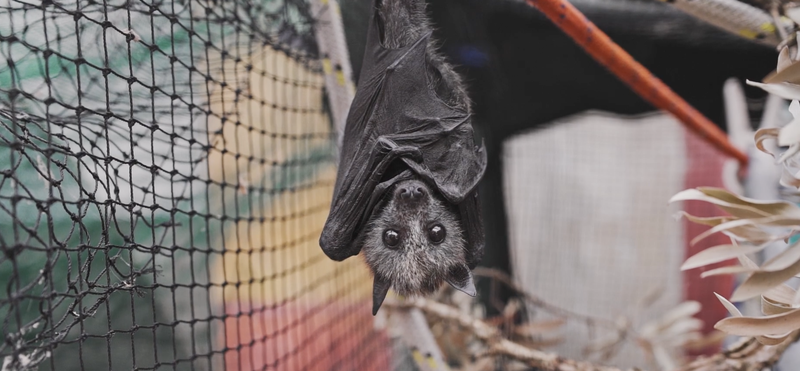These flying foxes build Australia’s forests while you sleep
Updated | By Beautiful News
Charmian Gradwell has an extraordinary love for bats and is committed to rehabilitating and protecting them.

As the sun disappears below the horizon, a cloud of flying foxes emerge. They dart between blossoming eucalyptus flowers, lapping up sticky nectar and digging into the occasional fig. Glittered with pollen, they soar amid the dense foliage and leave a trail of seeds in their wake. In the daylight, the fruits of their labour begin to sprout, growing entire forests. But the rapid loss of habitat coupled with climate change is threatening the survival of these bats in Australia. Reaching out a loving hand, Charmian Gradwell is helping them spread their wings and fly once more. “They’ve planted a lot of this country,” she says. “It should be their birthright to remain in it.”
Widely known as fruit bats, flying foxes are equipped with large eyes and pointy ears to forage among the treetops. They are not only a spectacle to watch in the sky, but also play a vital part on the ground. Through seed dispersal and pollination, they regenerate indigenous flora, keeping forests healthy and rich with life. “They are a keystone species,” Gradwell says. “They perform an ecological role for the world that no other animal can.” But these fantastic beasts have been listed as vulnerable by the IUCN. In the past century, land clearing, heat waves, and contact with man-made hazards like power lines have reduced the grey-headed and spectacled flying fox populations by 95%. Without their late night snacking, entire ecosystems could collapse. “We as humans have to learn to coexist with them,” Gradwell says. “We need them.”
In Sydney’s skies, fruit bats are a common occurrence. While living here, Gradwell developed an affinity for these peculiar creatures. After realising the threats these animals face in the city, she started rescuing and rehabilitating them. “If I can help prolong the moment when a species becomes extinct, then I will do that,” Gradwell says. Now a mother of bats, she spends her days hand rearing orphaned or injured pups until they are fit for release. Her home has become a place of refuge where they can safely recover. Although these forest foragers still have an arduous journey ahead, Gradwell will do whatever it takes to provide them with the strength to make it through. If we nurture a love for nature, everyone benefits.
- COVID-19 sowed seeds of disorder for farmers. This is the solution they cultivated
- The secret to their success? Sheer determination
- The fishing village sustained by community and crayfish
- The show will go on: Pioneering the virtual transformation of Africa’s largest arts festival
- This bakery is changing the way refugees earn their bread and butter
In the face of the COVID-19 crisis, you can help us spread information and hope. Share your positive stories by clicking here and we’ll be in contact.
Show's Stories
-
R20,000 Cognac order: The wildest food deliveries
From a whole lot of fried chicken to expensive cognac, here are some of ...
Stacey & J Sbu 1 day, 1 hour ago -
Update: Rocky the seal is one strong pup!
Do you remember the adorable seal who washed up on Rocky Bay Beach last ...
Stacey & J Sbu 1 day, 1 hour ago